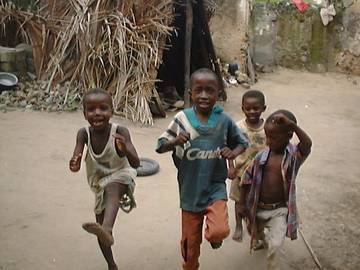Rajasthan is a land where the vagaries of nature have settled
to co-exist with the good cheer of its people. The
architectural grandeur of royalty and the tales of valour and
chivalry are the essence of its very spirit. Rajasthan is a
destination that enchants the visitor with every little
discovery that is made, because the more one discovers, the
more is the urge to stay on or come back. It offers a
unique destination for anyone’s holidays.
Jaipur, the first planned city of historic India, better
known as the pink city and the Venice of east is a perfect
combination of old and modern architect of India.
Pushkar is your host for rural, religion and culture of the
region. The Thar Desert tells a story of men living in
harmony with a hostile nature. It is not deserted but
contains a complete philosophy to live with the nature.
Ranthambore presents an opportunity for viewing wild life as
you can experience the first hand the habitat of the king of
the forest the tiger. The following ‘tour’ is in two
parts but shows how you can easily explore parts of
Rajasthan.
JAIPUR
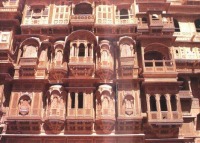 Jaipur, popularly known as the Pink City, was
founded in 1727 AD by the Maharaja of Amber Sawai Jai Singh.
This remarkable city is considered a marvel of town planning.
Designed in accordance with ancient Hindu treaties on
architecture, the Silpa Shastra, Jaipur follows a grid system
and is encircled by a fortified wall. The palace lies
in the heart of the city and occupies the space of the
central grid. The rest of the grids were cut across neatly by
wide lanes, which divided the area into tidy, well laid-out
rectangles of commercial and residential use. The fortified
wall has eight gates (originally had seven) and was built for
protection against invading armies and wild animals. Today
the city has spread beyond these walls and reached
neighbouring towns and continues to grow.
Jaipur, popularly known as the Pink City, was
founded in 1727 AD by the Maharaja of Amber Sawai Jai Singh.
This remarkable city is considered a marvel of town planning.
Designed in accordance with ancient Hindu treaties on
architecture, the Silpa Shastra, Jaipur follows a grid system
and is encircled by a fortified wall. The palace lies
in the heart of the city and occupies the space of the
central grid. The rest of the grids were cut across neatly by
wide lanes, which divided the area into tidy, well laid-out
rectangles of commercial and residential use. The fortified
wall has eight gates (originally had seven) and was built for
protection against invading armies and wild animals. Today
the city has spread beyond these walls and reached
neighbouring towns and continues to grow.
CITY PALACE
The city Palace complex is the most important landmark with
its numerous outbuildings, courtyards, impressive gateways
and temples. Occupying one seventh of the walled city
area, the city palace houses the seven storied Chandra Mahal
(residence of the royal family), Mubarak Mahal, the
Diwan-I-Am, and Diwan-I-Khas. The museum houses a rare
collection of arms, carpets, costumes, paintings and royal
paraphernalia. A notable exhibit is a pair of pure silver
containers, which are the largest single pieces of silver in
the world.
Across the road from the palace is the JANTAR MANTAR, one of
the five observatories built by Sawai Jai Singh, this one is
the latest and the best preserved. A collection of complex
astronomical instruments chiselled out of stone – most of
which continue to provide fairly accurate information to this
day – is the highlight of the observatory.
HAWA MAHAL (PALACE OF WINDS)
This adjoins the outside of the palace wall. Built in
1799 this pink seven storied building overlooks one of the
main streets and also provides some excellent views of the
city. Dedicated to the lord Krishna, it is shaped like
a crown, which adorns the Lord’s head. It has over 900
niches and is quite an unusual structure the likes of which
are not to be found anywhere else in the world.
AMBER FORT
Set in a picturesque location, Amber is a fascinating blend
of Hindu and Muslim architecture. Built in the 16th
century by Raja Man Singh, it sprawls on the hillside.
Built in red sandstone and white marble, the palace
complex has some very interesting apartments, the likes of
which are not to be found anywhere else in the country.
Jai Mandir, Sheesh Mahal, Sukh Niwas, Ganesh Pol are
some of the prominent areas of interest. The old
township of Amber lies at the foothills of the palace and has
an Old World charm, a character of its own.
PUSHKAR FAIR (November)
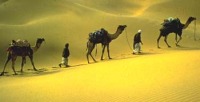 Held at Pushkar near Ajmer once in a year,
better known by the name of Pushkar Cattle Fair, is one of
the most colourful festivals of India. Thousands of pilgrims
come to bathe in the holy water of the Pushkar Lake. Legend
has it that the lake appeared miraculously on the spot, where
the petals of the lotus fell from the hands of lord Brahma.
Pushkar has an atmosphere of an ancient town, peaceful and
secluded but for twelve days of the month of KARTIK (Hindu
calendar), it transformed into a spectacular fair ground.
The fair is an amazing sight to behold including street
sellers showing off their dazzling range of wares in hundreds
of roadside stalls.
Held at Pushkar near Ajmer once in a year,
better known by the name of Pushkar Cattle Fair, is one of
the most colourful festivals of India. Thousands of pilgrims
come to bathe in the holy water of the Pushkar Lake. Legend
has it that the lake appeared miraculously on the spot, where
the petals of the lotus fell from the hands of lord Brahma.
Pushkar has an atmosphere of an ancient town, peaceful and
secluded but for twelve days of the month of KARTIK (Hindu
calendar), it transformed into a spectacular fair ground.
The fair is an amazing sight to behold including street
sellers showing off their dazzling range of wares in hundreds
of roadside stalls.
RELIGIOUS ACTIVITIES
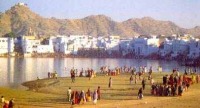 People come from different parts of
Rajasthan to worship lord Brahma and take bath in the holy
lake. Pilgrims start coming in the early morning in
groups singing the religious songs dedicated to Hindu gods to
bathe in the Pushkar lake. The process continues throughout
the day to turn into DEEPDAN ceremony. The entire
atmosphere reverberates with the ringing of bells. At
night, hundreds of small oil lamps placed on green leaves set
the lake alight. Shopkeepers keeps their shops open day
and night for the last three or four days to keep the city
alive.
People come from different parts of
Rajasthan to worship lord Brahma and take bath in the holy
lake. Pilgrims start coming in the early morning in
groups singing the religious songs dedicated to Hindu gods to
bathe in the Pushkar lake. The process continues throughout
the day to turn into DEEPDAN ceremony. The entire
atmosphere reverberates with the ringing of bells. At
night, hundreds of small oil lamps placed on green leaves set
the lake alight. Shopkeepers keeps their shops open day
and night for the last three or four days to keep the city
alive.
CAMELS AND CATTLE
Worlds largest number of camel gathering is a spectacular
seen that floods this area with thousands of tourist every
year. The most spectacular site besides the animals is the
day to day activity of the people who comes with the animals
and spend the day and night under open sky. Horse races,
camel races and other animal based events are organized by
the organizing committee to choose the best animal of the
fair.
If you would like to get in touch with Bhaghirath about
touring Rajasthan, he can be contacted by e-mail on: vision21century@sify.com
Discuss this article and give feedback in our online forum

 Jaipur, popularly known as the Pink City, was
founded in 1727 AD by the Maharaja of Amber Sawai Jai Singh.
This remarkable city is considered a marvel of town planning.
Designed in accordance with ancient Hindu treaties on
architecture, the Silpa Shastra, Jaipur follows a grid system
and is encircled by a fortified wall. The palace lies
in the heart of the city and occupies the space of the
central grid. The rest of the grids were cut across neatly by
wide lanes, which divided the area into tidy, well laid-out
rectangles of commercial and residential use. The fortified
wall has eight gates (originally had seven) and was built for
protection against invading armies and wild animals. Today
the city has spread beyond these walls and reached
neighbouring towns and continues to grow.
Jaipur, popularly known as the Pink City, was
founded in 1727 AD by the Maharaja of Amber Sawai Jai Singh.
This remarkable city is considered a marvel of town planning.
Designed in accordance with ancient Hindu treaties on
architecture, the Silpa Shastra, Jaipur follows a grid system
and is encircled by a fortified wall. The palace lies
in the heart of the city and occupies the space of the
central grid. The rest of the grids were cut across neatly by
wide lanes, which divided the area into tidy, well laid-out
rectangles of commercial and residential use. The fortified
wall has eight gates (originally had seven) and was built for
protection against invading armies and wild animals. Today
the city has spread beyond these walls and reached
neighbouring towns and continues to grow.
 Held at Pushkar near Ajmer once in a year,
better known by the name of Pushkar Cattle Fair, is one of
the most colourful festivals of India. Thousands of pilgrims
come to bathe in the holy water of the Pushkar Lake. Legend
has it that the lake appeared miraculously on the spot, where
the petals of the lotus fell from the hands of lord Brahma.
Pushkar has an atmosphere of an ancient town, peaceful and
secluded but for twelve days of the month of KARTIK (Hindu
calendar), it transformed into a spectacular fair ground.
The fair is an amazing sight to behold including street
sellers showing off their dazzling range of wares in hundreds
of roadside stalls.
Held at Pushkar near Ajmer once in a year,
better known by the name of Pushkar Cattle Fair, is one of
the most colourful festivals of India. Thousands of pilgrims
come to bathe in the holy water of the Pushkar Lake. Legend
has it that the lake appeared miraculously on the spot, where
the petals of the lotus fell from the hands of lord Brahma.
Pushkar has an atmosphere of an ancient town, peaceful and
secluded but for twelve days of the month of KARTIK (Hindu
calendar), it transformed into a spectacular fair ground.
The fair is an amazing sight to behold including street
sellers showing off their dazzling range of wares in hundreds
of roadside stalls.
 People come from different parts of
Rajasthan to worship lord Brahma and take bath in the holy
lake. Pilgrims start coming in the early morning in
groups singing the religious songs dedicated to Hindu gods to
bathe in the Pushkar lake. The process continues throughout
the day to turn into DEEPDAN ceremony. The entire
atmosphere reverberates with the ringing of bells. At
night, hundreds of small oil lamps placed on green leaves set
the lake alight. Shopkeepers keeps their shops open day
and night for the last three or four days to keep the city
alive.
People come from different parts of
Rajasthan to worship lord Brahma and take bath in the holy
lake. Pilgrims start coming in the early morning in
groups singing the religious songs dedicated to Hindu gods to
bathe in the Pushkar lake. The process continues throughout
the day to turn into DEEPDAN ceremony. The entire
atmosphere reverberates with the ringing of bells. At
night, hundreds of small oil lamps placed on green leaves set
the lake alight. Shopkeepers keeps their shops open day
and night for the last three or four days to keep the city
alive.
 The ringing of metal hitting metal in the early evening sunshine rang across the stillness of the Fiord as we moored for the first night on our Norwegian sailing trip. Driving a steel stake into the rock that had a ring attached allowed one to pass a warp through the ring and back to a cleat on the boat – Thus enabling any one to explore the shore easily by just jumping on to the rocks from the bow or stern, have a BBQ or merely to stretch their legs in the evening after a day at sea. The locals used this way of mooring up for the afternoon or night, and this was only possible because of the lack of tides in this part of the world. This was a very pleasant surprise after the difficulties with tides and mooring in the UK.
The ringing of metal hitting metal in the early evening sunshine rang across the stillness of the Fiord as we moored for the first night on our Norwegian sailing trip. Driving a steel stake into the rock that had a ring attached allowed one to pass a warp through the ring and back to a cleat on the boat – Thus enabling any one to explore the shore easily by just jumping on to the rocks from the bow or stern, have a BBQ or merely to stretch their legs in the evening after a day at sea. The locals used this way of mooring up for the afternoon or night, and this was only possible because of the lack of tides in this part of the world. This was a very pleasant surprise after the difficulties with tides and mooring in the UK.  We had set out in ‘Turid’ a 35 ft Halberg Sailing sloop, from Kragero in the south of the country to enjoy a few days break from tackling the stresses and strains of life in London. The Norwegian Skipper had an old 1780’s house overlooking his mooring and was just back from sailing round Greece. David and I have been friends since way back when we were nearly young. He has a wooden Folk boat on the south coast of England and I once had a four berth sailing cruiser moored in Conway. The second piece of luck was that as we boarded the sun came out and for the rest of the trip we had sunshine until about 2130 hours at night with a temperature of 26 degrees Centigrade at sea during the day. People expect it to be cold but in the summer this place can be extremely warm, in fact the week after we left the temperature rose another five degrees.
We had set out in ‘Turid’ a 35 ft Halberg Sailing sloop, from Kragero in the south of the country to enjoy a few days break from tackling the stresses and strains of life in London. The Norwegian Skipper had an old 1780’s house overlooking his mooring and was just back from sailing round Greece. David and I have been friends since way back when we were nearly young. He has a wooden Folk boat on the south coast of England and I once had a four berth sailing cruiser moored in Conway. The second piece of luck was that as we boarded the sun came out and for the rest of the trip we had sunshine until about 2130 hours at night with a temperature of 26 degrees Centigrade at sea during the day. People expect it to be cold but in the summer this place can be extremely warm, in fact the week after we left the temperature rose another five degrees. We started our trip around this wonderful coast with fir trees on the rocks and the houses right on the waterside. Rocks and inlets all around the place, so be careful if you’re not with a local skipper who has a good knowledge of the area. It seemed that everyone in Norway had some sort of boat and they were all making the most of the summer either in their holiday homes right by the sea or on the water.
We started our trip around this wonderful coast with fir trees on the rocks and the houses right on the waterside. Rocks and inlets all around the place, so be careful if you’re not with a local skipper who has a good knowledge of the area. It seemed that everyone in Norway had some sort of boat and they were all making the most of the summer either in their holiday homes right by the sea or on the water. We only docked to take on provisions, but we still had time to visit some of the excellent little ports – Risor, Arendal, Grimstad to name but three. Grimstad was my favourite with some of its wooden houses, in the old town, going back to 1729. I even encountered two Dutch cycle campers that were on a cycle way that took in six north European countries.
We only docked to take on provisions, but we still had time to visit some of the excellent little ports – Risor, Arendal, Grimstad to name but three. Grimstad was my favourite with some of its wooden houses, in the old town, going back to 1729. I even encountered two Dutch cycle campers that were on a cycle way that took in six north European countries.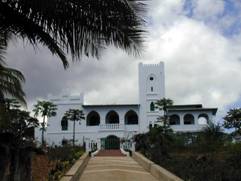 Seeing the Boma, (see photo by the Beetle,) now a fully restored small hotel is even more amazing than any of the photos I had seen, such a dramatic transformation from the derelict building here on my arrival, which was only just nearing completion when I returned for the millennium festivities. It now stands in grounds surrounded by all manner of vibrant vegetation, attracting varied animal life – from butterflies to lizards to the occasional monkey.
Seeing the Boma, (see photo by the Beetle,) now a fully restored small hotel is even more amazing than any of the photos I had seen, such a dramatic transformation from the derelict building here on my arrival, which was only just nearing completion when I returned for the millennium festivities. It now stands in grounds surrounded by all manner of vibrant vegetation, attracting varied animal life – from butterflies to lizards to the occasional monkey.